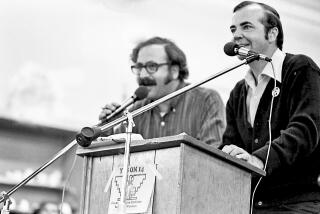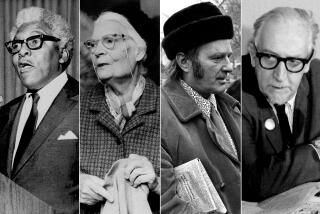Michael Harrington, Socialist Patriot
- Share via
America has been one long heartbreak for Socialists. The German sociologist Werner Sombart said that in America socialism “foundered on shoals of roast beef.” Samuel Gompers put the same thought in a different way when asked what it was that American unions wanted. “More,” he said.
In a nation with so much of that commodity to spread around, socialism could not take hold. Its promise was not “more” but justice; its accent, not American but European. Yet before the Great War, before the Bolshevik Revolution, socialism looked to be a rising force in America, appealing as it did to the victims of convulsive economic change. Eugene V. Debs, the saintly Socialist presidential candidate, got just shy of 1 million votes in the election of 1912. There were socialist mayors, city councilors, state legislators and Congressmen. But the frightening example of the Bolshevik Revolution and the dictatorship it installed in Russia killed American socialism in its tender roots. In that respect, “The Russian Revolution was the most conservative event of the 20th Century,” Michael Harrington was to write. Debs, the politician of promise in 1912, was in jail six years later. The 1920s were at hand: the decade of the binge of “more.”
Yet by 1930, “more” was out of gas; America out of work. And socialism, its diagnosis of capitalism vindicated on every street corner, got another hearing, in the courtly person of Norman Thomas. But it saw its program usurped--and tamed--by the New Deal. The New Deal saved the middle class, but the poor were left out of the postwar feast. It took Michael Harrington, a Catholic intellectual from the College of the Holy Cross, to rediscover them in the 1960s. With the publication of “The Other America,” Harrington became the third great figure in American socialism in this century. His death this week is loss all the way through--for his family and friends, for social hope, for America.
Radicals often make little effort to disguise their dislike of their native country. They are professional scolds--bitter in their marginality, their lack of importance. Harrington was not that kind of radical. In his autobiography, “Fragments of a Century,” he wrote:
“It was as a Socialist, and because I was a Socialist, that I fell in love with America. In saying that, I am not indulging in romantic nostalgia about youthful days on the road but rather underlining a crucial political truth. If the Left wants to change this country because it hates it, then the people will never listen to the Left and the people will be right. To be a Socialist--to be a Marxist--is to make an act of faith, of love even, toward this land. It is to sense the seed beneath the snow; to see, beneath the veneer of corruption and meanness and the commercialization of human relationships, men and women capable of controlling their own destinies. To be a radical is, in the best and only decent sense of the word, patriotic.”
Michael Harrington, dead this week at 61, was an American patriot, who dedicated his life to the paradoxical mission of criticizing “more” in the name of finer values, and of working tirelessly to spread “more” to the third of America that still has less than enough.
More to Read
Sign up for Essential California
The most important California stories and recommendations in your inbox every morning.
You may occasionally receive promotional content from the Los Angeles Times.












